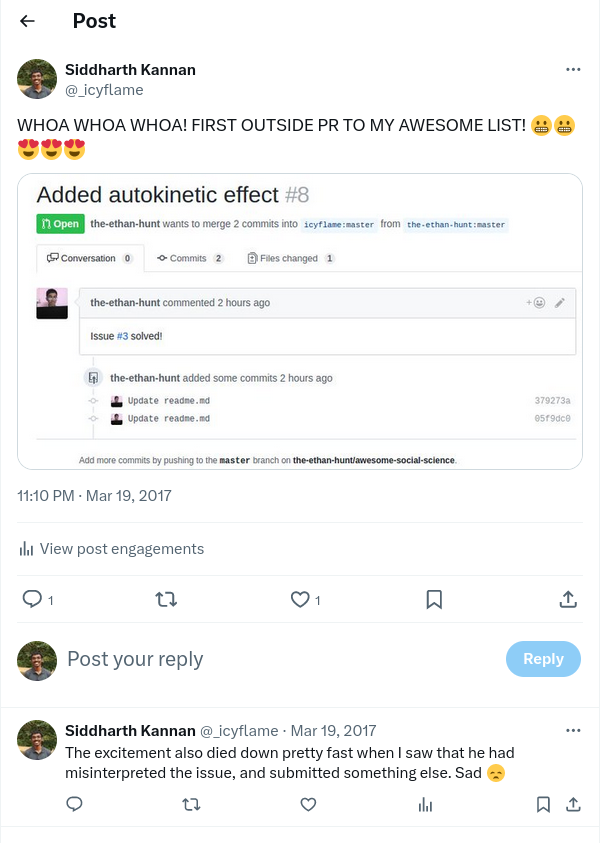Day 32 - Game of Thrones Questionnaire; Bias for our solutions; awesome-social-science
21 Mar 2017 100daysofwriting · awesome-social-science · game-of-thrones · metakgp · mfqp · pull-requestsToday, I watched this
video. That video linked to The
Game of Thrones Research Project which
is a group of people who have put out a public questinnaire and are keeping the
responses open for a period of time. They plan to do something with the results
and entries that they are going to get from it. Apparently, this kind of thing
falls into the genre of Audience Projects.
There is a longer explanation of what they plan to do with the data, and what they hope to learn from it on this page, and theses goals are mentioned there:
(1) To capture the range of responses that people have to the series, overall – why and how it matters to people to follow the story, and see how it unfolds, but also to understand why and how some people have been upset by particular elements. (2) To see how, for different people, this series finds its place among other modern fantasy stories. (3) To understand how people are bonding with the very different kinds of characters that GoT offers us, and who so often have awful fates ahead of them – and what sorts of pleasure you get from this. (4) To find out how people relate to the big controversies that have accompanied GoT – for example, the controversies around the changes from books to TV, the altered fates of various characters, and the series’ portrayals of sex, and sexual violence. (5) And to have a go at thinking how this ‘fantasy’ world of Westeros and beyond is seen to relate to our world, our mucky, violent, troubled world.
Now, the third point above about the characters is especially interesting to me! I would absolutely LOVE to know who the most liked character is (among the show fans, this might unequivocally be Tyrion Lannister, but among book audiences, I want to believe that Jaime has a chance. Time will tell.
Today, I also worked on this issue. The main goal of this issue is to create a “search” URL parameter which can be pre-filled into the only search bar on the MFQP frontpage. This would allow for linking directly when sharing with other people or when adding to course pages on the Wiki itself. (That way whenever new papers are added, they will automatically show up in the MFQP link that is available on each course page)
There was some back and forth about the approach to solve this problem. The
contributor, Punit implemented this by entering
into the message passing part of the code and editing it. Thinking about it at
first, I believed that it would be a really small change, and a bit more
investigation led me to this
patch,
which uses the jquery-url library and fills the search box and then calls the
search() function which will read the query, call the fuzzy search library
that is integrated into MFQP and finally show the results. This works!
My main arguments for my way of solving this problem are 1. the size of the
patch is way smaller and 2. it re-uses all the existing code and simply adds
some basic JS to use that code instead of delving into the message passing
mechanism. Also, my first impressions on seeing the old code (which I was doing
to get context on Punit’s pull
request) was that the message passing
was being used for the sole purpose of communicating that the data.json
Network request has been completed and if there is any query that needs to be
made, it should be made right now.
Since the discussion wasn’t going anywhere with just the two of us, I called for some more eyes on the code. The bias that we have for our own method of solving a problem and believing that it is the most elegant and pretty way to solve a problem often gets in the way and it’s best to get a second or third opinion instead of trying to re-introduce objectivity to the discussion. How emotional we are about a few lines of text that we write? :D
Also, this hilarious tweet series went out from me when I saw the first PR to my awesome-social-science list:
This was yesterday, or the day before. Dhruv Apte (@the-ethan-hunt) was kind enough to work on it again and submit another pull request, this time for the Golem Effect. I added the Pygmalion Effect entry some time ago, and it was a very very interesting read. I still remember the lighting conditions changing for factory workers and the external supervision by higher management, and how these two affected workers performance. TL; DR Higher management presence even with bad lighting yielded good performance from all the factory workers!
I look forward to reviewing that pull request and probably making some changes and merging it into the repository! One of his references came from the American Psychological Association, which surprisingly lets it’s users download full text PDFs of ALL the articles that are on the website. I was really surprised that they let people do that. Being inside IIT Kharagpur, I have access to some of the popular services like Elsevier, IEEE, ASME standards, but there are still a myriad other publications out there which charge a whopping $20-$30 for every research paper! (For comparison, 300-page Handmaid’s Tale cost me slightly less than $4.00)
Anyway, the APA website looks good and hopefully I will be able to find some time to read through some of the interesting articles. Also, it looks like a lot of D-News were sourced and fact-checked here. It would make sense too, the issues look long and can be a day job!
I have rambled on for long enough.
POST #32 is OVER
